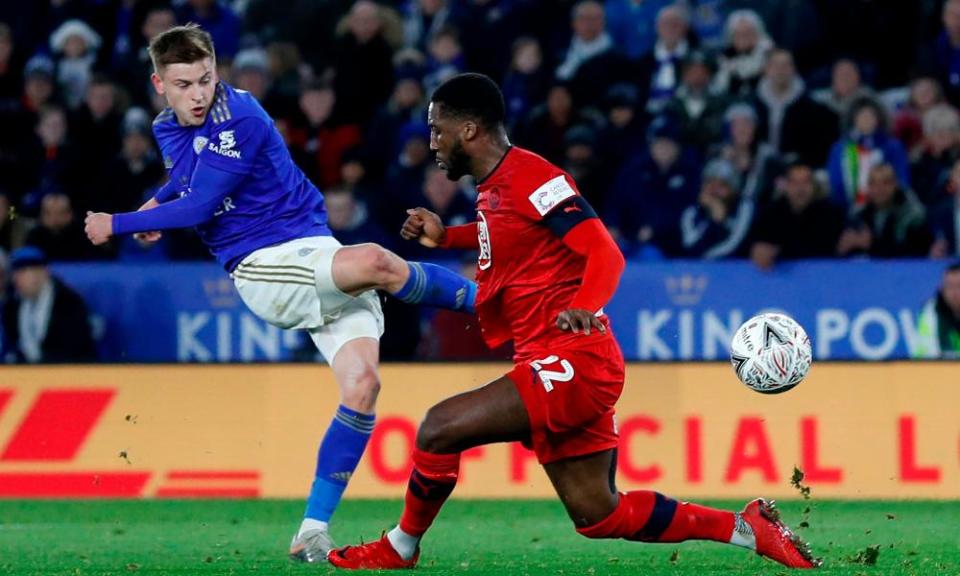Buzz around Leicester's Harvey Barnes shows benefit of loan system

Now the transfer market is hotting up, we should talk about Harvey Barnes. You can bet some of the best clubs in Europe are doing exactly that, trying to brainstorm ways of persuading Leicester to sell an exceptional forward before his value soars beyond reach, if it has not already. There has been constant yakking about the attractiveness of James Maddison, Ben Chilwell and Wilfried Ndidi to Champions League participants, but Barnes belongs in that conversation too.
When Barnes is on his game, he is one of those thrilling players who show that being creative first means being destructive. He is not in the same class as the 24-year-old Adama Traoré but he is not far off and at 22 is ahead of where the Wolves man was at the same age in terms of impact on the Premier League. Both players can make even the sturdiest defenders looks like old gates flapping in a storm. They are rapid, powerful, skilful and audacious and there is every reason to believe Barnes is as committed to improving and as receptive to good coaching as Traoré is. It takes clever men to cause as much chaos as these two regularly do.
Related: Men's transfer window summer 2020 – all deals from Europe's top five leagues
Which brings us to the other reason why clubs will mention Barnes this summer. If his future excites, his past illuminates. He is a choice example of how young players can benefit from loan moves, which are likely to be used more frequently than ever during the new financial reality inflicted by Covid-19.
Barnes’s talent has been carefully honed. He has been at Leicester since the age of nine. After he made his senior debut in a Champions League defeat by Porto four years ago when he was 18, he really started making strides when he went out on loan thereafter, enjoying successful spells at progressively higher levels, from MK Dons through to Barnsley and West Brom. “He is probably the perfect example of the loan and development process,” says Dean Hammond, who was Leicester’s loan manager when Barnes was being nurtured. Hammond helped to plan loan moves and would study Barnes’s progress, giving feedback to the player and parent club.
“Harvey was easy to manage because he wanted to be a player,” says Hammond, who left Leicester in November to take care of his family while his wife recovered from a back operation. “He has real natural ability and he works really hard. He understood the process of development. He scored more goals and got more assists at West Brom but in terms of traits and technique, his performances were very similar at MK Dons and Barnsley. He’s very fast and very direct. He likes to commit players, take them on.
“He likes the responsibility of taking on a shot, trying to slide a striker through or putting a cross in. He’s very forward-thinking. When he receives the ball, his first thought is to dribble forward. So a lot of the clips I’d make of him were very good and exciting to watch.”
But he was not perfect. “With Harvey, like with most young players, it was more about understanding the other side of the game, the defensive positioning. I know from my own time as a player that positional sense – learning to be in different situations – is the hardest thing to develop. At West Brom, sometimes Harvey would play the No 10 role, sometimes he’d be on the left wing and cut inside and sometimes he’d play on the right. So he was learning different positions. So you had to develop his positional sense.
Related: Premier League 2019-20 fans’ verdicts, part one: Arsenal to Liverpool
“You also had to teach him how to be effective every time he got the ball and how to be effective in different ways. It’s not contradictory to say it’s great to watch him take on a shot, slide a striker through or beat two or three players but you don’t always have to do that. There are times to just do a simple bounce pass or maybe keep the ball for a minute or two.”
Barnes grew into such a force at West Brom that Leicester recalled him in January 2019. He demonstrated his threat in his first start after his return, appearing to score against Wolves before the goal was credited to Conor Coady.
Brendan Rodgers replaced Claude Puel as Leicester manager a month later and has made Barnes a regular part of Leicester’s attack. His 36 appearances in the 2019-20 Premier League season included 25 as a starter. Usually he raids from the left wing but that he can strike the ball beautifully with either foot means defenders are seldom sure which way to direct him, if they get the choice.
Rodgers has spoken of how Barnes learned to press better as the season progressed. It was also clear in the early part of the season the youngster needed to find more composure in the box, although anyone who saw the purity of his goal against Sheffield United last August might not believe that.
Like Traoré before him, Barnes has learned to steady himself before delivering the final blow. Although he is still not as consistent as he is likely to become, Barnes was one of the few Leicester players who got better from January.
He scored six goals in the 11 matches just before lockdown and having been watched several times by Gareth Southgate would probably have earned his first senior England selection if the friendlies against Italy and Denmark had gone ahead in March. England are not exactly short of options out wide – Raheem Sterling, Jadon Sancho and Marcus Rashford are certain squad inclusions when fit – but Barnes can augment that platoon. “I think he will 100% represent his country,” says Hammond. “He’s different.”

 Yahoo News
Yahoo News 